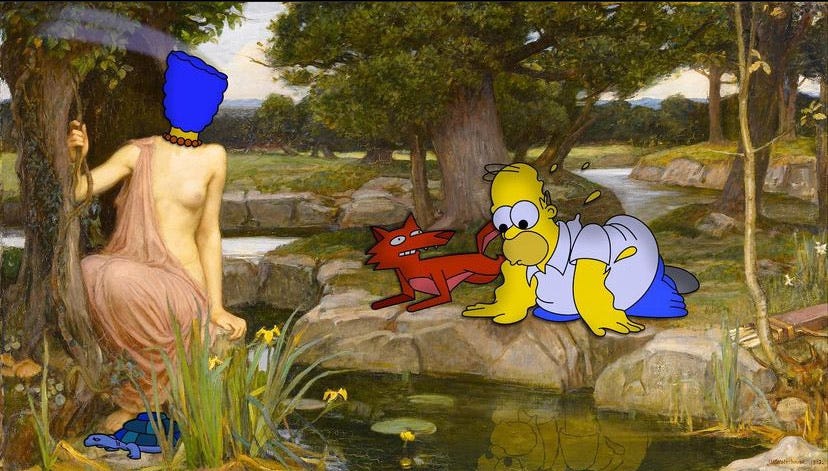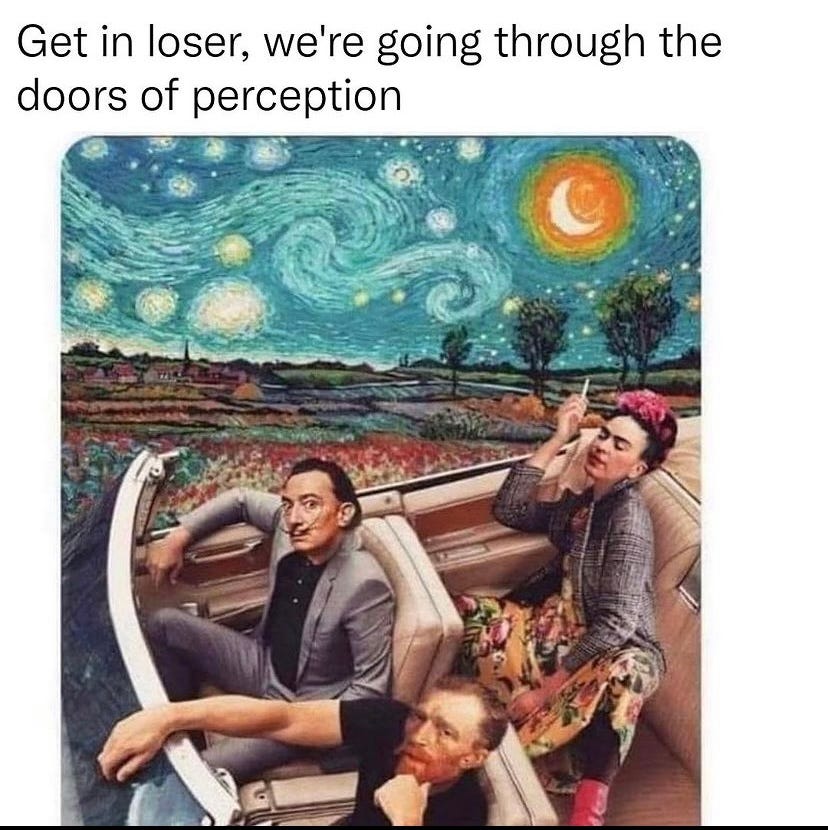I’ve been doing a lot of thinking lately about two things: 1) the rather striking porousness between my waking and dream lives, and 2) how ludicrously ego-driven the writing process can sometimes feel.
And let me clarify: when I say “ego-driven,” I’m not going for the strictly pejorative or judgmental connotation I would be were I using terms like “egotistical” or “self-centered.” I’m talking about the human ego as the fear-and-anxiety-engine that has you worrying and wondering all the time about whether you’re smart/talented/good enough. I’m talking about that nattering voice in your head that’s constantly judging you, comparing you to others, stressing about the many hypothetical judgments, comparisons, and perceptions that *could be* levied against you by said others.
Have you noticed how often that voice intrudes while you’re writing? (Or even just attempting to write?) You commit a sentence to the page and suddenly a whole host of thoughts bloom in your brain about its “stupidity,” its “illegitimacy.” You feel you have a wonderful idea for a novel but you worry whether it will sell, whether people have “seen it before,” or worst of all, whether you will become the butt of someone’s joke, be dismissed or canceled for the completely foolish risks you’ve decided to take. You wonder: “Am I really just a huge fraud? Is this whole undertaking embarrassing? Surely Person X, garnerer of major prize/book deal/media attention, would look upon my feeble attempts at ‘art’ and laugh.”
This, as I’m sure you already know, is how we talk ourselves out of our own creativity. Where it gets really sinister, though, is when we force ourselves to muddle through our writing practice while still being plagued by these thoughts — in some cases, even fooling ourselves into thinking of the thoughts as helpful guideposts, potential safeguards against career ruin and public humiliation. What ends up happening is a truly tragic compromise of our art and imaginations. We don’t write the story we’ve been wanting to write because it’s “too messy” or “too personal.” We avoid exploring a topic that could be potentially enlightening because we fear “doing it wrong” and then getting canceled.
Which brings me back to dreams, or what I’d like to call the “automatic storytelling function of the subconscious.” Where our ego-fettered waking consciousness tends to spend hours perseverating over whether a scene in a story in which someone pays for a slice of cake with cash is believable1 or not, our dream consciousness will dish up a scene in which the main character is understood to be both a leopard seal and cyborg assassin2 at once, and their reasons for wanting to start a ska band (but being, like, really pushy about it) make perfect sense. Our dream consciousness is fearless, both in the many formal/technical/genre risks it takes, and in the way it acts as a kind of narrative mirror for who we are. Sorry, Iowa Writers’ Workshop: the human subconscious is the original inventor of “show, don’t tell.”

Lately, I’ve been having these liminal moments where I’ll close my eyes in meditation and enter not into sleep or actual dreaming, but into this ethereal nether realm in which the the dream-underpinnings of my waking life and waking-underpinnings of my dream life are simultaneously revealed. The effect has been sort of like having a conversation with someone I love that I know I’m not actually having, but is nevertheless taking place on some level: either through some archetypal “script” stored in my head (sort of like a program I’m running that “instantiates” all the knowledge I’ve been storing about that person), or through some psychic collision (call me kooky, but I don’t think we’re above paying each other visits in our dreams!), or something else entirely. Either way, I’ve been much more enthralled by the dream and dream-adjacent than usual.
So in the spirit of wanting to harness the wild narrative properties of the dream and dissolve all that tedious ego-chatter, I came up with this end-of-semester prompt to give all my students, grad and undergrad:
Ego Death Exercise
In this exercise, you will give voice to your observing “I” over your unbridled, demanding “me” by attempting a form of creative ego death. Like the attendee of an ancient shamanic ceremony or the early psychoanalytic patients of Sigmund Freud and Carl Jung, you will venture into your cosmic interior. To do this, please:
Call to mind a particularly powerful dream you’ve had. It can be a recent one, or one from many years ago: all that matters is that you remember it and that it affected you emotionally.
“Build out” that dream into a short story (i.e. give it an actual plot and characters – we all know how dream logic doesn’t always make sense in waking life).
As you’re doing this, try not to force a waking-life interpretation onto the dream. Rather, use your knowledge of craft to create a story that makes sense on the page, but be open to the message your subconscious was trying to broadcast to you.
Remember to practice detachment from the outcome of the story. You are not here to write some perfect, polished gem, but rather to decode a fascinating interior secret.
Can’t think of a dream? Instead, identify a scene in a story or novel (or movie or TV show or an artwork, etc.) that affected you profoundly, on a level so deep and emotional it’s almost difficult to put into words. Then, build that scene out into a work of fanfiction that aims to explore what, specifically, was so meaningful to you about that scene. Once again, you are not egoically imposing meaning on that scene, but rather inhabiting its characters inquisitively and observantly, with the intention of exploring why their actions affected you so profoundly.
CNF/memoir version: Same principle, but instead of writing a short story building out the dream, write a personal essay from your dream character’s POV. Keep in mind this needs to be dream-you, not waking-you-talking-about-dream-you. So if I had a dream about being a farmer who bred unicorns as livestock, I’d be writing about what it’s like to raise these unicorns from little horned calves, how I take care of them, whether or not I slaughter them (yikes!) Even though this essay is from dream-you’s POV, feel free to also weave in biographical info about waking-you as well. Consider how waking-you mirrors the reality of dream-you and vice versa.
If you opted to write about a really powerful scene in literature or film or art that affected you, then you’ll write a personal essay from the POV of the character you most closely identify with in that scene. That character is now dream-you, and you are writing an essay about what their life is like, and what it mirrors for waking-you (and vice versa).
So, dear subscriber, what do you think of this prompt? Would you like to join my students in trying it out for yourself? If you end up giving this prompt a try and would like me to see what you’ve written, send it to me at frumkinr@gmail.com with the subject line “Your Name + Ego Death Prompt.” If you upgrade your subscription to paid, I’ll write back with some personalized feedback!
Happy dreaming, and enjoy this mini ego-break :)
This cursed word. How much dreaming has been undone through its repeated, slap-on-the-wrist utterance in writing workshops around the world?
“A cyborg who’s an assassin, not someone who assassinates cyborgs. You can tell the difference from the shoes they’re wearing, duh” — Your subconscious.





